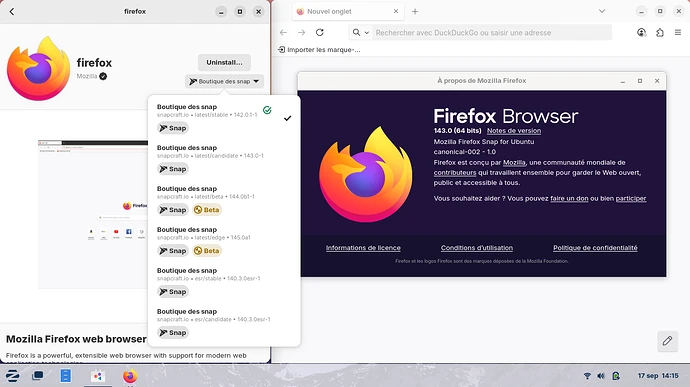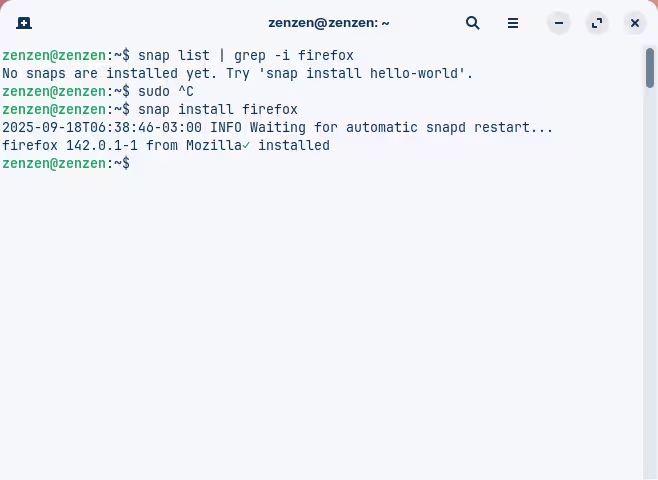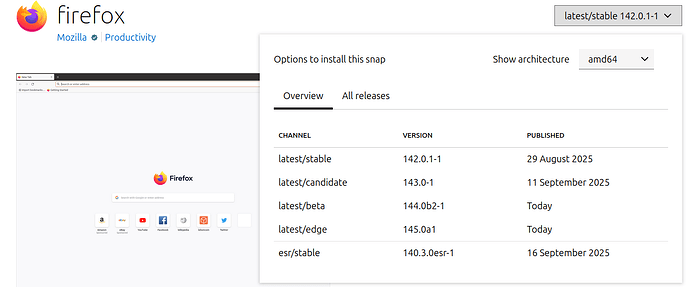A clarification regarding my screenshot...
The initial installation of Firefox was done from the console.
You've made a sudo apt install firefox to install Firefox, yes? And You got the Snap Version? That shouldn't be the Case. When You make a sudo apt update do You see in the List of Adresses Mozilla one's?
It shouldn't but it is.
Snap is Canonical product just as Flatpak is Gnomes.
So, Canonical wrote a redirect for package installs to Snap for Ubuntu. When you sudo apt install, this leads to a package that is not that package installer, but instead a preconfigured Snap Installer.
Canonical and Gnome are busy squabbling with each over, and the end users are caught in the middle.
And both mislead and misdirect with package management.
You can install the .deb package of mozilla firefox this way:
I thought this was addressed in Zorin OS. There's a config to give priority to Mozilla's repositories in /etc/apt/preferences.d/mozilla.
@merinos Any chance that you have two versions of Firefox installed? You can check by running these two commands in the terminal:
snap list | grep -i firefox
apt list -i | grep -i firefox
Only one should produce output.
If you download Firefox from Mozilla and install, you still have the snap version of Firefox installed. Two icons appear, one for each. You could remove the snap package with snap remove, and then uninstall the firefox package you installed with apt. When that's all done, you still have the snap system (snapd) installed, since it's a pre-dependency of firefox.
dmn@Kayleigh:~$ apt depends firefox
firefox
PreDepends: debconf
PreDepends: snapd (>= 2.54)
|Depends: debconf (>= 0.5)
Depends: <debconf-2.0>
cdebconf
debconf
I use Ubuntu as well as Zorin, since I like keep up with what is going on In Ubuntuland.
By the way, in Ubuntu I now just leave the snap Firefox installed. I can't tell the difference. It used to be slow to start, but they fixed that.
But when You have the Mozilla Repo added, You have a higher Priority for it like @zenzen already wrote. So, this shouldn't happen when this is there. Without it, yes. Then this leads to Firefox Snap for the Reason that You wrote.
Thanks for all your feedback. ![]()
The exact command was: sudo snap install firefox
And I don't really mind, as long as Firefox is up to date... It's just good to know.
Well that is the Reason why You get Firefox Snap. You typed snap install and not apt install
The problem is not the source, but the inconsistency of the version number between the Software program and the actual version of Firefox (142.x versus 143.x).
You need to look much better at my screenshot. ![]()
The versions shown are labeled. The installed version is the latest stable. The 143 is a Candidate, not a Stable.
The 144 are Beta's
Then the pattern repeats for the ESR edition of Firefox; it has slightly different version numbers because it is a different track.
I suspect that the Maintainer of the Snaps has the inconsistency of you showing 142 latest stable installed but the actual installed version is the Candidate 143. Probably copy/pasted metadata...
That is strange... After installing it with the same command, I have the correct versions showing up:
Snapcraft website also seems correct:
I wonder if these versions were not up to date when the package was installed, but fixed since then.
But, if it works it works!
You have to wait a little while for snapd (or a colleague) to execute the update... It's not immediate.
And version 143 has been available for a few days: www.firefox.com/en-US/firefox/143.0/releasenotes
Why you won't find me ever using snap.
"The primary criticisms of Snap within the provided sources are related to its performance, system integration, and philosophical concerns. Snap packages are reported to be slower to install and start, consume more RAM and disk space due to redundant dependencies, and can slow down boot and shutdown times.
The system integration is also criticized, with Snap packages creating separate file subsystems that can clutter the system and interfere with file manager displays.
Furthermore, the Snap backend and store are proprietary and controlled by Canonical, which goes against the open-source ethos for many users.
This centralization is seen as a form of corporate control, similar to a "walled garden".
The forced nature of Snap on Ubuntu, where installing a package like Firefox via apt can result in the Snap version being installed without user consent, is a major point of contention.
This is viewed as a violation of user autonomy, a principle that is central to the Linux philosophy.
While some users find Snap convenient for certain applications like Nextcloud, the overall sentiment in the provided sources is that the drawbacks—especially the lack of user choice, performance issues, and proprietary backend—outweigh the benefits for many."
For me, the only concern in this story is: apps.gnome.org/en/Software
He already doesn't uninstall Brave well, and now he's late in synchronizing with Firefox in snap.



